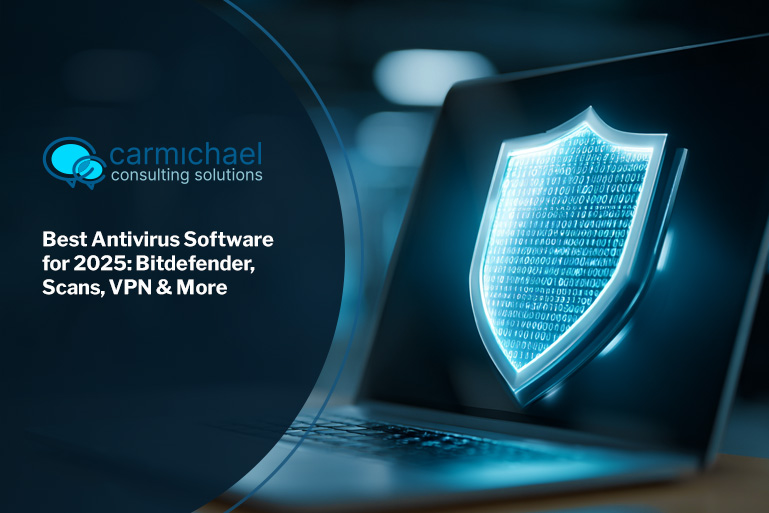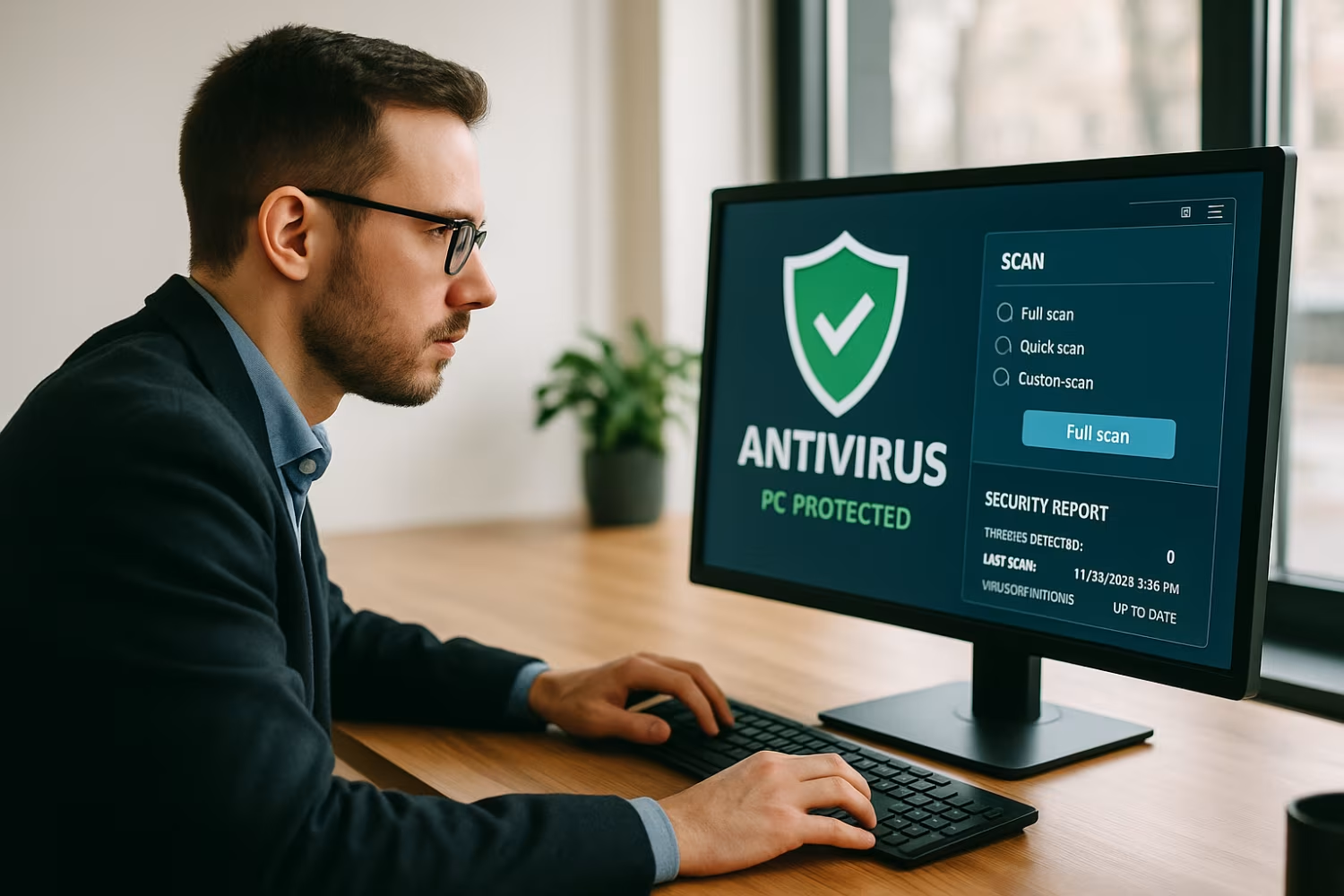
Choosing the best antivirus software isn’t just about avoiding pop-ups or deleting a few suspicious files. For businesses, it’s about protecting sensitive data, customer trust, and operational continuity. In this guide, you’ll learn what makes antivirus software effective, how to evaluate your options, and which tools stand out in 2025. We’ll also cover common threats like spyware, trojans, and adware, and how to detect and prevent them across different operating systems.
[.c-button-wrap2][.c-button-main2][.c-button-icon-content2]Contact Us[.c-button-icon2][.c-button-icon2][.c-button-icon-content2][.c-button-main2][.c-button-wrap2]
Antivirus software is more than just a tool—it’s a layer of protection between your business and the growing number of cyber threats. From ransomware to phishing attacks, the risks are real and constantly evolving. That’s why choosing the best antivirus software is critical for keeping your systems secure.
Modern antivirus solutions do more than just scan for viruses. They offer real-time protection, malware detection, and even VPN support. Some are tailored for specific devices like iOS or Windows 10, while others provide cross-platform coverage. With so many options, knowing what to look for can help you avoid costly mistakes.

Not all antivirus tools are created equal. Here are the most important features you should consider when evaluating your options:
Real-time protection ensures threats are identified and blocked as they happen. This is essential for preventing malicious files from executing on your system.
Ransomware can lock you out of critical files. Look for antivirus software that includes ransomware protection to stop these attacks before they cause damage.
Phishing attacks often come through email. A good antivirus should scan incoming messages and flag suspicious links or attachments.
Some antivirus tools include a VPN, which encrypts your internet traffic. This adds another layer of security, especially for remote workers or public Wi-Fi use.
Look for antivirus software that performs well in independent testing. These results show how well the software detects and blocks various types of malware.
Whether your team uses Windows or Mac, your antivirus should protect all devices. Some tools also support mobile platforms like iOS.
Security software should run in the background without slowing down your laptop or desktop. Lightweight tools are better for performance.
When evaluating antivirus software, keep an eye out for these essential features:

Bitdefender continues to be a top choice for businesses thanks to its strong malware protection and user-friendly interface. It offers advanced features like ransomware remediation, phishing defense, and a built-in VPN. Bitdefender Antivirus Plus is especially popular among PC users for its lightweight design and high detection rates.
Other tools like Avast and Norton 360 also offer solid protection. Avast includes a free antivirus version with basic features, while Norton 360 provides a more comprehensive antivirus solution with cloud backup and parental controls.
Choosing the best antivirus software depends on your specific needs—whether that’s protecting a small team or managing multiple devices across different locations.
Selecting the right antivirus software involves more than picking a popular name. Here’s how to make a smart decision:
Start by identifying the type of malware your business is most likely to encounter. This could include spyware, trojans, or phishing attacks.
Some antivirus tools are free, but paid versions often include advanced features like ransomware protection and VPNs. Know what you’re willing to spend.
Make sure the software supports your operating systems. Whether you use Windows 10, macOS, or iOS, compatibility is key.
If you’re managing multiple devices, choose a tool that offers centralized control. This makes it easier to deploy updates and monitor threats.
Good customer support can save time during setup or when resolving issues. Look for providers that offer 24/7 assistance.
Run a trial to see how the software affects your system’s speed. Some antivirus tools are known for slowing down devices.
Check independent testing labs and user reviews to see how the software performs in real-world scenarios.

Once you’ve chosen your antivirus software, proper implementation is key. Start by installing the software on all devices and enabling automatic updates. This ensures you’re protected against the latest threats.
Next, schedule regular antivirus scans and review reports for any unusual activity. Train your team to recognize phishing attempts and avoid downloading unknown files. Finally, integrate your antivirus with other security tools like firewalls or endpoint protection platforms for layered defense.
To get the most out of your antivirus software, follow these best practices:
Following these steps helps maintain strong antivirus protection across your business.

Are you a business with 10 to 350 employees looking for reliable antivirus protection? If you're growing and need to secure your data, devices, and users, we can help you choose the best antivirus software tailored to your needs.
Our team at Carmichael Consulting Solutions specializes in helping businesses implement antivirus solutions that offer real-time protection, malware detection, and ransomware defense. We’ll guide you through selection, setup, and ongoing support—so you can focus on running your business securely.
[.c-button-wrap2][.c-button-main2][.c-button-icon-content2]Contact Us[.c-button-icon2][.c-button-icon2][.c-button-icon-content2][.c-button-main2][.c-button-wrap2]
Antivirus refers to the general concept of detecting and removing harmful programs, while antivirus software is the actual tool that performs these tasks. Antivirus software scans your system to detect threats like trojans, spyware, and adware. It also helps protect your laptop or desktop from future infections.
Antivirus software uses signature-based detection and behavior analysis to identify malware. It compares files against a database of known threats and watches for suspicious activity. This helps detect viruses, ransomware, and other types of malware before they can cause damage.
Free antivirus can offer basic protection, but it often lacks features like ransomware protection and centralized management. For businesses, especially those using multiple operating systems, a paid antivirus solution is usually a better fit. It provides more comprehensive virus protection and better support.
Bitdefender offers strong malware protection, real-time scanning, and low system impact. It’s especially effective at blocking phishing attacks and encrypting sensitive data. Bitdefender also performs well in independent testing, making it a reliable choice for PC users and businesses alike.
You should schedule full antivirus scans at least once a week. Many antivirus tools also offer real-time protection, which scans files as they are accessed. Regular scans help detect hidden threats like spyware, adware, and other malicious software.
Yes, many modern antivirus tools include phishing and ransomware protection. They scan emails and websites to block malicious links and attachments. Some also include VPNs and other security features to enhance your overall defense against cyber threats.
